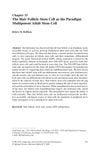 13 citations,
December 1991 in “Annals of the New York Academy of Sciences”
13 citations,
December 1991 in “Annals of the New York Academy of Sciences” Researchers created a lab model to study human hair growth, showing it can grow and self-regulate outside the body.
 5 citations,
September 2012 in “Springer eBooks”
5 citations,
September 2012 in “Springer eBooks” Nanoparticles can be used to deliver drugs to hair follicles, potentially improving treatments for conditions like acne and alopecia, and could also be used for vaccine delivery and gene therapy.
 2 citations,
February 2024 in “Nature cell biology”
2 citations,
February 2024 in “Nature cell biology” Mechanical forces are crucial for shaping cells and forming tissues during development.
 1 citations,
January 2008 in “Springer eBooks”
1 citations,
January 2008 in “Springer eBooks” Hair follicle stem cells can turn into many cell types and may help repair nerve damage and have other medical uses.
 80 citations,
April 2017 in “Frontiers in Pharmacology”
80 citations,
April 2017 in “Frontiers in Pharmacology” PDRN helps repair tissue and improve wound healing with a high safety profile.
 60 citations,
January 2004 in “The journal of investigative dermatology/Journal of investigative dermatology”
60 citations,
January 2004 in “The journal of investigative dermatology/Journal of investigative dermatology” Applying a specific inhibitor lightens skin and hair color.
 47 citations,
April 2017 in “European Journal of Pharmaceutics and Biopharmaceutics”
47 citations,
April 2017 in “European Journal of Pharmaceutics and Biopharmaceutics” The new dutasteride formula can be applied to the skin, may promote hair growth, and has fewer side effects.
 25 citations,
July 2017 in “Journal of Stomatology, Oral and Maxillofacial Surgery”
25 citations,
July 2017 in “Journal of Stomatology, Oral and Maxillofacial Surgery” PRP injections help regrow hair, reduce hair loss, and increase hair thickness, but effects decrease without ongoing treatment.
 19 citations,
December 2015 in “Journal of Materials Chemistry B”
19 citations,
December 2015 in “Journal of Materials Chemistry B” Scientists have created a method to deliver specific cells that can regenerate hair follicles, potentially offering a new treatment for hair loss.
 15 citations,
November 2015 in “Journal of Dermatology and Dermatologic Surgery”
15 citations,
November 2015 in “Journal of Dermatology and Dermatologic Surgery” Mixing platelet-rich plasma with triamcinolone acetonide can potentially improve hair regrowth in alopecia areata patients.
 1 citations,
August 2017 in “Journal of food and nutrition research”
1 citations,
August 2017 in “Journal of food and nutrition research” The herbal supplement increased hair thickness and reduced scalp oiliness in women.
 September 2023 in “Frontiers in bioengineering and biotechnology”
September 2023 in “Frontiers in bioengineering and biotechnology” JAGGED1 could help regenerate tissues for bone loss and heart damage if delivered correctly.
 14 citations,
April 2018 in “ACS Biomaterials Science & Engineering”
14 citations,
April 2018 in “ACS Biomaterials Science & Engineering” Nanoemulsion is a promising method for delivering luteolin to promote hair growth without minoxidil's side effects.
3 citations,
June 2021 in “Frontiers in genetics” The protein STAT3 slows down cell growth by blocking the FST gene, which affects hair development in sheep.
 October 2007 in “Humana Press eBooks”
October 2007 in “Humana Press eBooks” Saw palmetto can help with prostate issues and may promote hair growth.
 21 citations,
January 2022 in “Biomaterials Science”
21 citations,
January 2022 in “Biomaterials Science” RNA delivery is best for in-body use, while RNP delivery is good for outside-body use. Both methods are expected to greatly impact future treatments.
1 citations,
February 2023 in “Ibrain” Black cumin and its nanoformulations show promise in treating neurodegenerative diseases.
 June 2008 in “Dermatologic Surgery”
June 2008 in “Dermatologic Surgery” Hydrogen peroxide may have both positive and negative effects on wound healing, and its safe concentration for hair transplant surgery is unclear.
 211 citations,
February 2009 in “European journal of pharmaceutics and biopharmaceutics”
211 citations,
February 2009 in “European journal of pharmaceutics and biopharmaceutics” Hair follicles help absorb and store topical compounds, aiding targeted drug delivery.
 69 citations,
June 2017 in “Experimental Biology and Medicine”
69 citations,
June 2017 in “Experimental Biology and Medicine” Advanced human skin models improve drug development and could replace animal testing.
 60 citations,
June 1997 in “Drugs & Aging”
60 citations,
June 1997 in “Drugs & Aging” Mitoxantrone with a corticosteroid helps manage symptoms for some advanced prostate cancer patients but doesn't extend life.
 45 citations,
February 2018 in “Journal of basic and clinical physiology and pharmacology/Journal of basic & clinical physiology & pharmacology”
45 citations,
February 2018 in “Journal of basic and clinical physiology and pharmacology/Journal of basic & clinical physiology & pharmacology” *Acorus calamus* has many medicinal benefits but needs more safety research.
 10 citations,
June 2019 in “International Journal of Cosmetic Science”
10 citations,
June 2019 in “International Journal of Cosmetic Science” Some plant-based chemicals may help with hair growth, but more research is needed to confirm their effectiveness.
 3 citations,
March 2017 in “Regulatory toxicology and pharmacology”
3 citations,
March 2017 in “Regulatory toxicology and pharmacology” Aleglitazar and its major metabolite are safe enough to proceed to Phase 3 clinical trials.

Sensory neuron and Merkel-cell changes in the skin happen independently during normal skin maintenance.
 42 citations,
January 2021 in “Journal of Clinical Medicine”
42 citations,
January 2021 in “Journal of Clinical Medicine” Microneedle arrays with nanotechnology show promise for painless drug delivery through the skin but need more research on safety and effectiveness.
 July 2023 in “Journal of Ethnopharmacology”
July 2023 in “Journal of Ethnopharmacology” Amla fruit syrup improved hair growth and satisfaction in women with hair loss without significant side effects.
 June 2020 in “Journal of Investigative Dermatology”
June 2020 in “Journal of Investigative Dermatology” Certain bacteria can enhance skin regeneration.
 162 citations,
August 2004 in “Journal of Investigative Dermatology”
162 citations,
August 2004 in “Journal of Investigative Dermatology” Hair loss causes stress and affects mental health; treatment and support needed.
 68 citations,
March 2018 in “Biomaterials”
68 citations,
March 2018 in “Biomaterials” Tiny needles with valproic acid can effectively regrow hair.




























